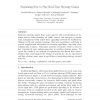601 search results - page 3 / 121 » Playing large games using simple strategies |
ECAI
2006
Springer
13 years 9 months ago
2006
Springer
Abstract. Computational Game Theory is a way to study and evaluate behaviors using game theory models, via agent-based computer simulations. One of the most known example of this a...
GECCO
2003
Springer
13 years 10 months ago
2003
Springer
Abstract. Most modern real-time strategy computer games have a sophisticated but fixed ‘AI’ component that controls the computer’s actions. Once the user has learned how suc...
SAGT
2010
Springer
13 years 3 months ago
2010
Springer
Fictitious play is a simple learning algorithm for strategic games that proceeds in rounds. In each round, the players play a best response to a mixed strategy that is given by the...
SGAI
2009
Springer
13 years 11 months ago
2009
Springer
Real-time strategy games share many aspects with real situations in domains such as battle planning, air traffic control, and emergency response team management which makes them a...
CORR
2002
Springer
13 years 5 months ago
2002
Springer
Game theoretic models of learning which are based on the strategic form of the game cannot explain learning in games with large extensive form. We study learning in such games by ...



